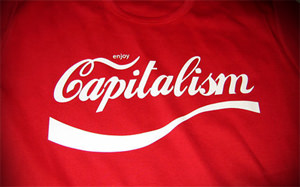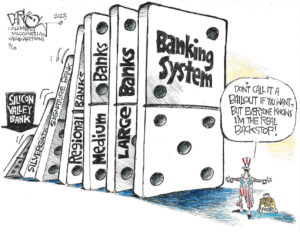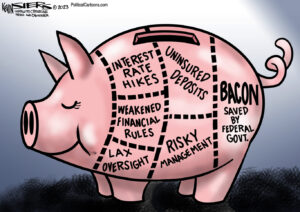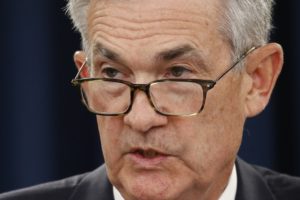Another Bailout Joins the Goofball Economy
The whole thing is nuts. The economy is a shambles, saved from a free fall only by the Federal Reserve’s unprecedented promise of free money for banks for at least two years.
The whole thing is nuts. The economy is a shambles, saved from a free fall only by the Federal Reserve’s unprecedented promise of free money for banks for at least two years. That’s how long a seven-member majority of the Fed’s Open Market Committee expects it to take for significant relief to take hold for the 25 million Americans who can’t find full-time employment.
The 10-member committee’s three dissenters in Tuesday’s decision, all unelected Fed regional board presidents, are free-market ideologues who don’t believe the government has a role to play in reversing the nation’s economic disaster. One is a former Wall Street investment banker and vice chairman of Henry Kissinger’s consulting firm. The other two are University of Chicago school of economics disciples long committed to free-market purism and blind faith in the mathematical models that had much to do with radical deregulation and the subsequent collapse of the financial markets.
That view led Minneapolis Fed President Narayana Kocherlakota, before he assumed his Fed position, to sign a petition that the libertarian Cato Institute placed in various newspapers opposing President Barack Obama’s economic stimulus plan.
The dissent of the three members is thought to have prevented the Fed from pursuing more vigorous action such as the anticipated “QE3” purchase of additional securities. As New York Times columnist Floyd Norris speculated, “perhaps the dissenters really want to essentially say something like ‘We’ve done all we can, and if the economy is still lousy, that is for someone else to deal with.’ ”
Meanwhile, Obama has been reduced to an impotent bystander promising vigorous budget cuts in response to Standard & Poor’s adverse credit rating. The president’s pathetic performance on Monday, as the market crashed, was the low point of his career. Nor did it help that the rush of investors to Treasury bonds validated his bold claim that the United States of America deserves a perfect credit rating. On that point he is right, but Obama’s failure to challenge the idiocy demanded by S&P, along with the Republicans — that government spending be dramatically cut in the face of an economic crisis — cast his remarks as terminally tepid.
How dare a credit rating agency that got it so wrong, and should itself be investigated for malfeasance in the creation of the banking meltdown, dictate public policy? For S&P to insist on massive government cuts that would only increase joblessness is like a burglar shifting blame for his crimes to the poor quality of locks.
This from a credit rating agency that, as NYT columnist Joe Nocera points out, “has consistently fallen short.” S&P judged Enron to be an exemplary company until shortly before the corporation imploded, and it gave its triple-A seal of approval to the toxic securitized mortgage debt that caused the great recession. There are serious problems with the U.S. economy, but they are not the ones that Standard & Poor’s outlined when it sent the stock market into a tizzy.
We don’t need draconian cuts in government spending at a time when the economy remains mired in deep unemployment, when state and municipal governments are shedding jobs and when the housing market is on life support. And if some Amercians thought that we did and voted to put irresponsible Republicans in charge of the House of Representatives, isn’t it the duty of the president and his fellow Democrats in control of the Senate to fight back? That’s called democracy, and we need more of it instead of the false unity for which Obama settled.
Sure, it would have been much better if a phony populist movement called the tea party had not been financed by fat cats out to preserve their unseemly tax breaks and thereby gained control of the House. That’s what undermined what S&P termed the “effectiveness, stability, and predictability of American policymaking and political institutions [that] have weakened at a time of ongoing fiscal and economic challenges. …” But, as S&P acknowledged with its downgrade after the congressional vote on the debt ceiling, the fact that the president caved was of no help.
The result is that Obama has agreed to effectively remove the elected federal government from the battle to restore economic health and instead left us to the tender mercies of the banker-dominated Federal Reserve, which, like the folks at S&P, condoned the reckless Wall Street policies that got us into this mess. At a time when we need a full-throated defense of the role of government in protecting the interests of a majority of Americans suddenly made deeply vulnerable by the chicanery of the financial oligarchy, we are denied even the logical clarity of a former community organizer who once promised hope.

|
Click here to check out Robert Scheer’s new book, |
Independent journalism is under threat and overshadowed by heavily funded mainstream media.
You can help level the playing field. Become a member.
Your tax-deductible contribution keeps us digging beneath the headlines to give you thought-provoking, investigative reporting and analysis that unearths what's really happening- without compromise.
Give today to support our courageous, independent journalists.




You need to be a supporter to comment.
There are currently no responses to this article.
Be the first to respond.